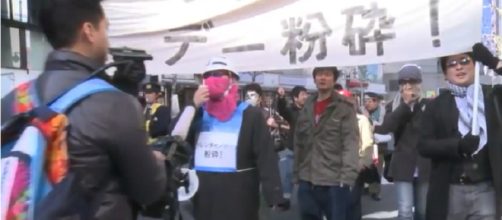It has become a tradition in Japan that women offer men ‘chocolates’ on Valentine’s day. However, this sweet tradition has been severely criticized by a number of protesters who gather every year to march against Valentine’s Day. These protesters carry placards that read “Making out in public is terrorism” and “Pulverize Valentine’s Day.”
The tale behind their march
Japan celebrates its Valentine’s Day by observing a custom known as “giri” in which girls are obliged to offer gifts (chocolates) to their male workmates. Nevertheless, such practice has already been banned in a number of offices in Japan seeing its stressful effect on women.
Worse, the guys in the office don’t even want the chocolate. But the good thing is that this giri-chocolate has eventually become affordable choco bars, and women would always prefer them for gifts over other pricey sweets.
Men, on the other hand, ought to give their female coworkers some sweets during the White Day, which is celebrated exactly a month after Valentine’s Day. Seemingly, both special days appear to be one-sided.
This year, just like the previous years since the birth of Kakumeiteki Himote Doumei, protesters get together to march against Valentine’s Day. Kakumeiteki Himote Doumei, in English, loosely means “The Revolutionary League of Lonely Souls”. However, this group of protesters comes in small numbers.
Notably this year, there are women who joined the protest. Their participation no longer makes the group exclusive for unpopular men.
Slogans of resistance
“Resist romance capitalism!” is among the group’s protest slogans. Another slogan reads “Resist the opposition to otaku culture that can be enjoyed even if you don’t have dates!” But the most striking of all: “Don’t discriminate others on the number of times they’ve had s*x!”
For blogger William Andrews, the slogans don’t essentially engender sexism, misogyny or offensive language. On his blog "Throw Out Your Books," Andrew writes, “the group’s publicity warns participants against dabbling in discriminatory speech or provocation.” Apparently, this follows the Japanese policy of self-protection for protesters against any legal trouble, which could lead to the rejection of a permit to march the next time around.
The birth of the march
The protest against the romantic day began in 2006. There are those who believe that the leaders of the group could either be devoted jokesters who always try to get the limelight or they simply wish to eradicate Valentine’s day. Or it could be a mix of both.
On Sunday, the group made a public demonstration in Shibuya. They chose that day for their protest instead on February 14 probably because they have jobs and these lovelorn people need to work. Sunday’s protest became open to everybody who wished to participate. But prior to the march, the group’s leaders took the time for media interviews, underscoring the impression that the protest is but a stunt or a gag.
What’s even surprising is that the protesters also march against Christmas and White Day. These are also special days for couples to go out on a date. Obviously, the group protests Christmas not for any religious reasons, but for dating ones: a lovelorn’s woe.


